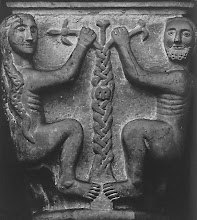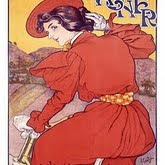I first conceived an enthusiasm for Robert Burns in junior high for his
wee sleekit beastie
and
But gie me a cannie hour at e’en,
My arms about my dearie, O;
An’ war’ly cares, an’ war’ly men,
May a’ gae tapsalteerie, O!
Then I stumbled upon Emily Dickinson:
I dwell in Possibility—
A fairer House than Prose—
More numerous of Windows—
Superior—for Doors—
Then e.e. cummings:
i thank You God for most this amazing
day:for the leaping greenly spirits of trees
and a blue true dream of sky;and for everything
which is natural which is infinite which is yes
And this trio shaped my emerging literary taste in favor of the personal lyric, purposely simple, persistently strange, but strongly rhymed and metered. I relished the unfamiliar word, the apt image, the quirky epiphany, and above all-- a poem was a poem if it sounded like a poem.
upon
a red wheel
barrow
glazed with rain
water
beside the white
chickens
(Are you washed in the blood of the Lamb?)
The Saints smiled gravely & they said: “He’s come.”
(Are you washed in the blood of the Lamb?)
I was unconvinced. I wanted to know why such scorn for the sounds of poetry? Is the eye better than the ear? Do we really have to titter if the line is singable?
Through high school I read Robert Frost:
My Sorrow, when she’s here with me,
Thinks these dark days of autumn rain
Are beautiful as days can be;
She loves the bare, the withered tree;
She walks the sodden pasture lane.
and Edna St. Vincent Millay:
Wild swans, come over the town, come over
The town again, trailing your legs and crying!
Then abandoned his straightforwardness and her hard bright clarity for T.S. Eliot, who was reassuringly erudite and deep and whose poems could be chanted aloud as if they were mantic words of power:
There is shadow under this red rock,
(Come in under the shadow of this red rock),
And I will show you something different from either
Your shadow at morning striding behind you
Or your shadow at evening rising to meet you;
I will show you fear in a handful of dust.
Of course I studied English at college, where I found - one breathless evening reading Julius Caesar all the way through in one sitting - that Shakespeare was indeed a poetic genius and his reputation not just a conspiracy between Leonard Bernstein and the NEA. I fell in love with the sounds of medieval English lyric, "I sing of a maiden that is makeless," and "Adam lay ibounden, Bounden in a bond." I admired the complex wit of Wallace Stevens and John Donne, and against my biases to their buxom lines came to acknowledge the talent of William Wordsworth, Coleridge, and Keats. I read Robert Frost for pleasure and William Carlos Williams for the quiet focus of his poems. I guiltily glutted myself on A.E. Houseman and Gerard Manley Hopkins and the Cavalier lyric poets. Eagerly gathered poems by Maxine Kumin, Mary Oliver, Anne Sexton, and May Swenson like post cards from earthy, older, cackling sisters. Gloried in the richly textured visions of William Butler Yeats and William Blake, the evocative spareness of Li Po, and the goofy, all-embracing, exultingly detailed irresistible optimism of Walt Whitman.
In grad school I studied Anglo-Saxon poetry: Beowulf, Caedmon's Hymn, The Wanderer, and the writings of medieval women mystics (Julian of Norwich, Hildegard of Bingen). I found respite in the limpid and stately vulnerability of the poems by Robert Hass and shook off academia's pretensions in the cheekiness of Anna Swir and the rougish stubbornness of Wislawa Szymborska. I read Louise Gluck's Wild Iris over and over - for reasons I still can't put satisfactorily into words.
Several years I taught monthly poetry workshops in the schools. Seeking poems that would speak to the young, I found myself returning to the most musical, like the powerful images and gorgeous beat of Blake's Tyger, Tyger.
And for my own soul, I still read poetry. Most recently, sick at heart and needing comfort, I found myself reading again Inger Christensen's alphabet, a series of poems written originally in Danish, based on the Fibonacci sequence, a chant that re-creates, re-establishes the world in its familiar beauty, despite and within the terror we find here, too. (English translation by Susanna Nied):
1
abrikostræerne findes, abrikostræerne findes
apricot trees exist, apricot trees exist
2
bregnerne findes; og brombaer, brombaer
og brom findes; og brinten, brinten
bracken exists; and blackberries, blackberries;
bromine exists; and hydrogen, hydrogen
cikaderne findes; cikorie, chromog
citrontraeer findes; cikaderne findes;
cikaderne, ceder, cypress, cerebellum
cicadas exists; chicory, chromium,
citrus trees; cicadas exists;
cicadas, cedars, cypresses, the cerebellum
4
duerne findes; drømmerne, dukkerne
dræberne findes; duerne, duerne;
dis, dioxin og dagne; dagne
findes; dagene døden; og digtene
findes; digtene, dagene, døden.
doves exists; dreamers and dolls;
killers, and doves and doves;
haze, dioxin, and days; days
exist; days and death; and poems
exist; poems, days, death
Christensen's poem goes on through most of the letters of the alphabet, each section longer and more complex, more weighed down by our presence in the world. But it ends with hope - not just the children who have found shelter in the cave but the echoes of that swelling chant of witness: "apricot trees exist, apricot trees exist, bracken exists, and blackberries, blackberries . . . " - a chant that steadies the mind and focuses the eye, fills the heart with courage and readies us for better action.
I read for courage as much as for enlightenment. So my definition of poetry is a powerful playing, a laughing at the destroyer, a dance we do in honor of our hearts' truth, a marriage of the body (the fecund matrix of sounds and rhythms of the world and human speech; the detailed matter that makes a forest or a street or a human body; the things that matter to us walking here beneath the sky) with the spirit (the acrobatics of metaphorical thought, patterns of rhyme and alliteration, the connections of logic and dream, the idea of order).
Matter and pattern. Patterns that matter.




No comments:
Post a Comment